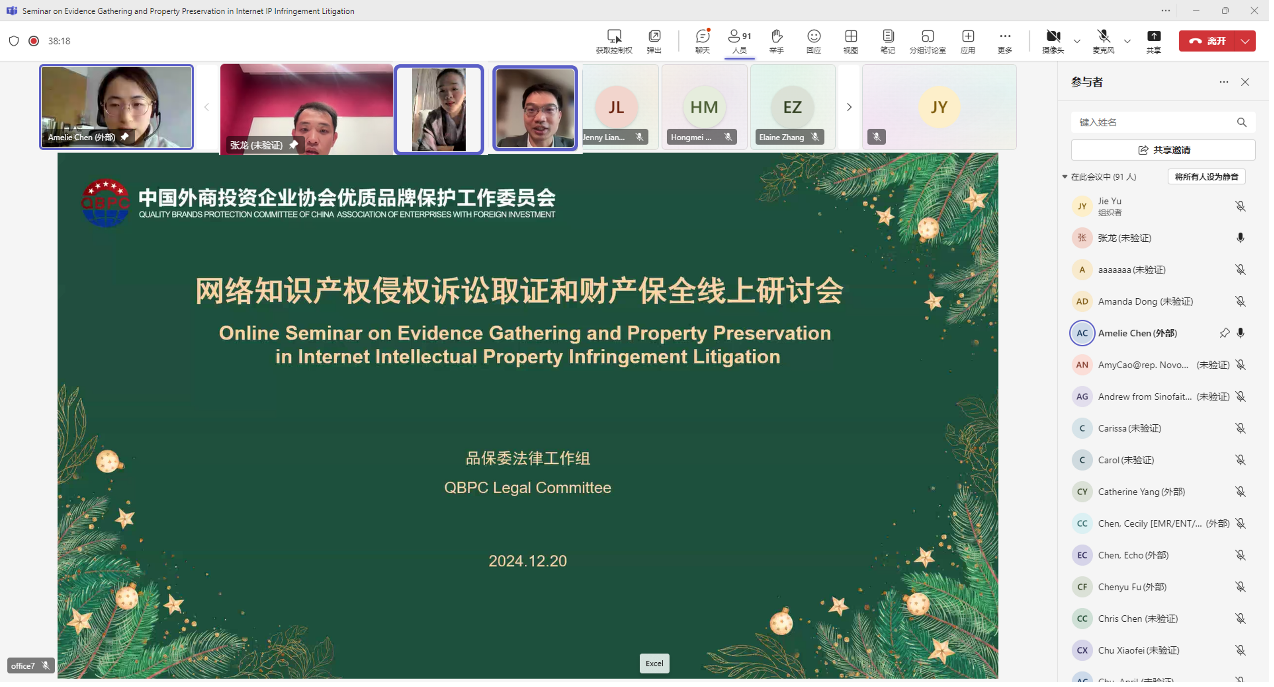On December 20th, the QBPC Legal Committee held an online seminar on evidence gathering and property preservation related to internet intellectual property infringement litigation. The meeting featured right holders, representatives from online platforms, and lawyers who discussed various issues related to internet intellectual property infringement from different perspectives. More than 110 QBPC members attended the seminar.

As the moderator of the event, QBPC Legal Committee Vice Chair Amelie Chen addressed the challenges and response strategies related to evidence gathering and property preservation in internet IP infringement lawsuits from the perspective of a right holder. She highlighted several obstacles in obtaining evidence for relevant lawsuits, including instances where some courts rejected requests for evidence collection and where certain platforms failed to provide detailed and specific evidence. Concerning property preservation, some courts imposed high threshold for cash deposit or even denied requests with the excuse of case complexity. Furthermore, there were difficulties in accessing and preserving accounts on newly-emerging payment platforms. These issues required more proactive communication and advocacy from right holders, as well as active support from various platforms.
Secondly, Long ZHANG, a lawyer from the Douyin Litigation Team, shared his insights on Douyin's rules regarding evidence gathering and property preservation in cases of internet intellectual property infringement. He provided a comprehensive overview of the investigation and evidence collection procedures on Douyin. The latest guidelines for investigation, evidence collection, and enforcement assistance can be accessed through the “Douyin Investigation and Evidence Collection Collaboration Center” account. Right holders should pay particular attention to various entities as receivers in the evidence collection process. Additionally, he discussed online evidence preservation, back-end notarization, and packet capture notarization, emphasizing the importance of property preservation and sharing case management skills based on his professional experience.
Subsequently, Wenjie ZHOU, Head of Intellectual Property Litigation at Taobao and Tmall Group, elaborated on the conditions and processes for merchant information disclosure. She specifically addressed the various requirements that must be met by the complaining party, the specific methods of information disclosure, and the definitions of scenarios in which non-disclosure is permitted under special circumstances. Additionally, she provided a detailed explanation of the key components of the investigation and evidence collection methods related to the disclosure of sales data and other information, as well as relevant materials and the various inquiry channels available.
Finally, Wenxuan Chen analyzed the typical legal issues and cases related to e-commerce. He examined the legal characterization of label cutting and barcode grinding, providing a detailed explanation of the application of trademark infringement, unfair competition, and the principle of rights exhaustion in different circumstances. Additionally, he elaborated on the legal consequences of label cutting and barcode grinding through analyzing several real cases. Furthermore, he discussed the specific application of sales volume displayed on the platform while calculating damages, as well as the significant impact of placing false purchase orders and manipulating credit ratings on compensation amounts and other critical issues.
In the Q&A session, guest speakers answered the questions raised by the participants, such as the specific procedures and requirements for Douyin to collaborate with relevant law enforcement authorities during investigations and evidence collection, the different types of litigation applicable to back-end notarization, and effective strategies for defending the rights against the act of selling trademark-infringing products and obtaining substantial data, etc.
